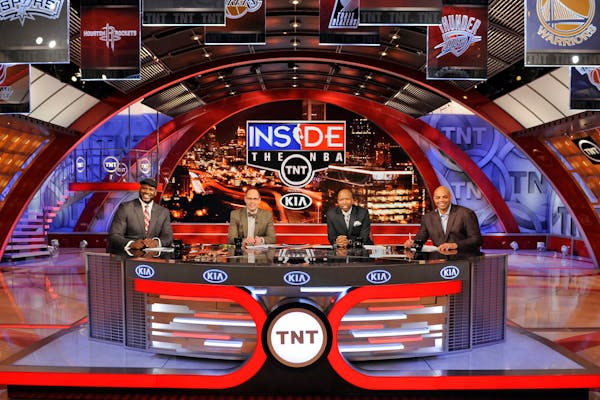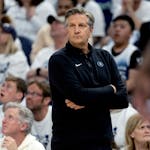 See
more of the story
See
more of the story
The Timberwolves don't merely belong in Minnesota's sports pantheon of pain now.
They've built their own exhibit.
In their 104-95 loss to Memphis in Game 3 of their NBA playoff series, they didn't just mimic Gary Anderson and Blair Walsh missing game-winning field goals.
They blew two leads, to honor each.
So irrelevant for so long, the Wolves returned to the spotlight in Minneapolis on Thursday, and the scene could not have been more conducive for a franchise-elevating victory.
Prince played on the PA. A sellout crowd flooded the court with noise.
For years, Target Center has enjoyed this kind of atmosphere only when the right concert rolls through town.
On this night, the Wolves were the rock stars mounting the stage, only to be called out for lip-synching their biggest hits.
They blew a 26-point lead in the first half, and a 25-point lead in the second half.
Ranking as one of the best offensive teams in the NBA, they scored 12 points in the second quarter, and 12 in the fourth.
Their franchise player, Karl-Anthony Towns, produced more fouls (five) and tantrums (infinity) than field goal attempts (four). The best big player on the court looked the smallest when it counted most.
Asked how he could finish with just four shot attempts, Towns quickly said, "Next question.''
In another room, Grizzlies players were having trouble answering questions without laughing giddily.
In the Wolves' interview room, Towns offered his most heartfelt answer when he repeatedly rapped his knuckles on the table while reading the box score.
The Wolves were knocking on the door of a two-games-to-one series lead. They were positioning themselves to upset a No. 2 seed, just a year after winning just 23 games.
They were about to become the talk of the basketball world. Then they allowed Memphis to close the game with a 50-16 run.
Now the Wolves are back to being the talk of the NBA on TNT.
Charles Barkley has long accused Towns of being less than he should be. It was easy to dismiss Barkley's sometimes-obtuse commentary while Towns was enjoying another statistically-dominant season. It's not so easy now.
About half an hour after they seemed poised to take the lead in a series that they could then expect to win, the Timberwolves collapsed in a way that called into question their maturity and toughness.
If they had lost by nine points because Memphis is demonstrably better and was going about proving that, this loss wouldn't be so painful, or embarrassing.
What the Wolves did Thursday was prove that basketball is sometimes played between the ears, and sometimes beneath the ribs, and if you don't have the requisite gray matter and guts, you might as well book tee times for late April.
"There's a lot we can learn,'' Wolves guard Patrick Beverley said. "And we will.''
The Wolves have returned home-court advantage to Memphis. They have also given Memphis an even bigger advantage: The knowledge that if you make the Wolves uncomfortable, they'll fold.
Blame the Wolves' offense for this. You can also blame coach Chris Finch for failing to call timeouts when his team was so obviously in need of a break, but there's no guarantee that timeouts would have had the desired effect.
The offense disappeared twice, at points where just running a functional offense would have kept Memphis at bay.
Towns and Finch combined to keep Towns out of the flow of the offense, and Towns' frustration led him to commit five fouls and lose his composure on the bench.
Beverley helped the Wolves build their 26-point first-half lead, scoring 12 first-half points. He scored two points in the second half, taking at least a few ill-advised shots.
In many ways, the Wolves are more talented than Memphis, but Memphis plays with intelligence and refined intent. The Grizzlies know exactly who they are.
Today, sadly, the Wolves may, too.
They are the newest members of Minnesota's sports pantheon of pain.
And this one game may require two exhibits.






